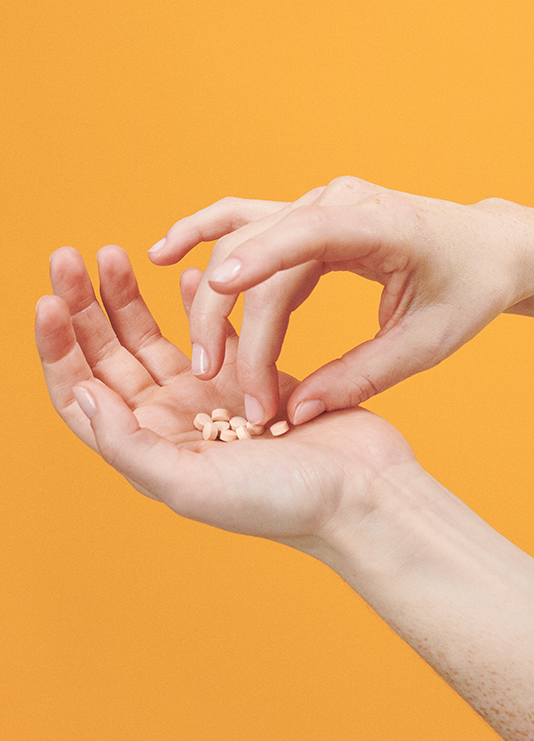Okay, so you’ve heard of tetrahydrocannabinol (THC), but have you heard of tetrahydrocannabivarin (THCV)? Similar to THC, THCV—when consumed in large enough amounts—can interact with receptors in your body’s endocannabinoid system (ECS) to produce a range of effects.
Aside from their similar abbreviated names and remarkably similar chemical structures, these two cannabinoids are actually quite different from one another. Here’s everything you need to know about THCV vs. THC, including their key differences, potential benefits, and use cases.
THC vs.THCV : How They Work and Potential Benefits
THC and THCV are cannabinoids produced by cannabis and hemp plants. When consumed, they interact with the body's endocannabinoid system (ECS) which is a unique cell-signaling communication system that plays an important role in the regulation of various processes and functions in the body, such as sleep, mood, inflammatory response and pain, metabolism, and memory. It’s comprised of two receptor types: endocannabinoid type I and type II (CB1 and CB2) receptors which are located throughout your body, including the nerve cells in your brain and spinal cord, gastrointestinal tract, skeletal muscles, vascular system, and skin.
THC
THC is the chemical responsible for most of marijuana’s psychoactive, or intoxicating, effects and has been researched for decades. Like many cannabinoids, it’s converted from the parent molecule cannabigerolic acid (CBGA) into the chemical precursor, tetrahydrocannabinolic acid (THCA) as the plant matures. THC is then produced from THCA by exposing the plant material to heat or through some other decarboxylation process.
THC interacts with endocannabinoid receptors at numerous locations in the body, though it primarily interacts with endocannabinoid receptors in the central nervous system (the brain and spinal cord). Because THC binds strongly to CB1 receptors in the brain and CB1 receptors target cognitive functions like thinking, judgment, and short-term memory, THC produces intoxicating effects. These effects include things like slowed reaction time, poor judgment, heightened anxiety, and poor short-term memory.

Aside from the intoxicating effects, THC has some interesting potential therapeutic applications. Because CB1 receptors also target appetite and the perception of pain, THC may help stimulate appetite and ease mild aches and pains. THC is also known to interact weakly with CB2 receptors in the ECS which are predominantly found in cells and tissues in the immune system, so there are some potential future applications there as well.
THCV
THCV, unlike many well-known cannabinoids, is converted from the parent molecule cannabigerovarinic acid (CBGVA) to the chemical precursor, tetrahydrocannabivarinic acid (THCVA) as the plant matures. THCV is then produced from THCVA in a similar way to THC (decarboxylation).
THCV is a much newer focus in the scientific and clinical research space, so we don’t yet know as much about THCV as we know about cannabinoids like THC, cannabidiol (CBD), and cannabichromene (CBC). We do know that THCV is believed to be less psychoactive when compared to THC.
Scientific research into how THCV works with the ECS and its potential benefits is in the early stages; however, based on animal studies, researchers currently think THCV may block CB1 receptors, which are well-known for stimulating appetite. Because of this, THCV may be used to reduce appetite. It’s currently being investigated in a clinical research setting for its potential to be used to manage obesity and diabetes. Anecdotal evidence suggests THCV may also boost energy, concentration, and focus, though more research is needed to understand the mechanisms behind these reported effects.
Key Differences Between THC vs. THCV
To summarize, here are the main differences between THC vs.THCV :
-
Potential use cases for THC include appetite enhancement and mitigation of everyday aches and pains. Potential use cases for THCV include appetite suppression and enhanced energy and concentration.
-
While THC is known to be strongly psychoactive, THCV is believed to be less psychoactive.
-
THC binds to CB1 receptors while THCV is believed to block CB1 receptors.
-
Structurally speaking, the only difference between THCV and THC at a molecular level is that THC has a longer hydrocarbon chain.
Feals: Delivering Premium THCV Focus Melts to Your Doorstep
At Feals, we’re dedicated to providing you a better way to feel better—and focus better. Our THCV focus melts are crafted with quality ingredients that are third-party tested. If you still have questions about the difference between THCV and THC, our customer service team would be more than happy to help out. Just give them a ring.
If you still have questions about THCV vs. THC or about what Feals can do for you, call our CBD hotline at 844-311-9090 or check out our products today.
These statements have not been evaluated by the Food and Drug Administration. This product is not intended to diagnose, treat, cure, or prevent any disease. This article is for informational purposes only. It is not, nor is it intended to be, a substitute for professional medical advice, diagnosis, or treatment and should never be relied upon for specific medical advice.
